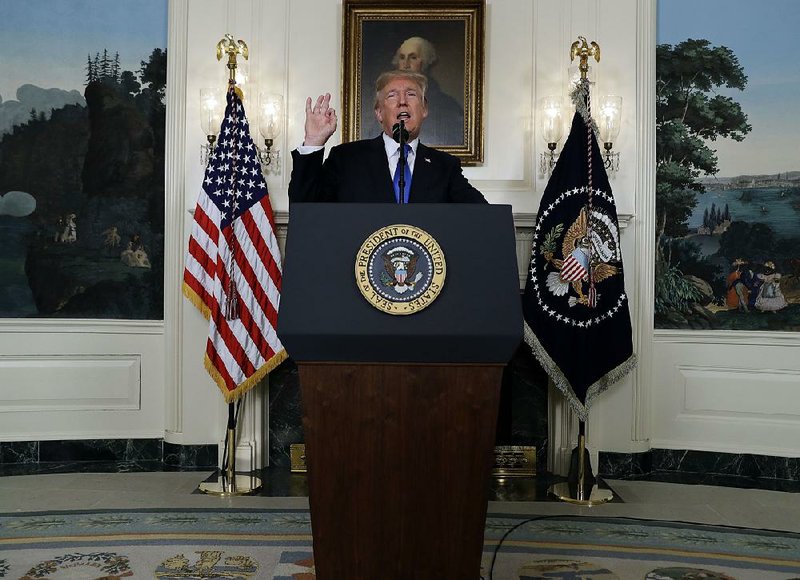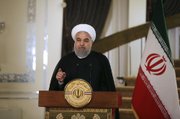WASHINGTON -- President Donald Trump declared a hardened stance toward Iran on Friday as he refused to certify that the Islamic Republic is in compliance with the multinational accord to curb its nuclear program, though he stopped short of repudiating the pact.
Trump said the agreement wasn't serving U.S. national security interests and that the Iranian regime's aggression has only escalated since the pact was reached in 2015. He talked of new sanctions on Iran, particularly on its hard-line Islamic Revolutionary Guard Corps, and threatened to terminate the agreement unless parties to the deal address its shortcomings.
"Iran is not living up to the spirit of the deal," the president said. The regime has "spread death, destruction and chaos all over the globe."
The move puts pressure on Congress to craft new legislation that would further isolate Iran.
[PRESIDENT TRUMP: Timeline, appointments, executive orders + guide to actions in first 200 days]
After twice in the past acquiescing to arguments from advisers and U.S. allies, who say Iran is keeping its end of the deal, Trump refused to certify Iran's compliance with the accord, which gives it relief from sanctions in return for curtailing its nuclear program. Trump had to act before Sunday, the next deadline set under a law Congress passed to monitor the agreement.
"We will not continue down a path whose predictable conclusion is more violence, more terror, and the very real threat of Iran's nuclear breakout," Trump said.
Trump criticized the nuclear deal as "one of the worst and most one-sided transactions the United States has ever entered into." He said the accord threw an economic and political lifeline to a regime he called "the world's leading state sponsor of terrorism."
Congress now has 60 days to introduce legislation reimposing the sanctions on Iran that were eased under the agreement -- a move that would be likely to kill the accord.
Instead, Trump asked Congress to amend the law, the Iran Nuclear Agreement Review Act. He requested that Congress set specific trigger points that would automatically reimpose sanctions unless Iran meets a list of U.S. demands, including to curb its ballistic-missile program.
"In the event we are not able to reach a solution working with Congress and our allies, then the agreement will be terminated," Trump said.
The administration also wants Congress to pass new legislation targeting so-called sunset provisions in the nuclear agreement that ease restrictions on Iranian uranium enrichment in coming years.
"I don't want to suggest to you that this is a slam-dunk up there on the Hill; we know it's not," Secretary of State Rex Tillerson said. Legislation would put "much more stature behind this expectation we have on Iran than currently exists under the JCPOA," he said.
The Joint Comprehensive Plan of Action is the agreement reached during President Barack Obama's administration between Iran and the U.S., Germany, the U.K., France, Russia and China. All of the other participants -- and inspectors from the International Atomic Energy Agency -- say Iran is complying with it.
ALLIES RESPOND
Persuading the allies to renegotiate the deal appears to be a far-fetched goal. The leaders of Britain, France and Germany quickly issued a joint statement urging the United States to adhere to the agreement, which they hailed as "the culmination of 13 years of diplomacy." Iran's president, Hassan Rouhani, said his country would consider "no amendment whatsoever" to the deal.
British Prime Minister Theresa May, German Chancellor Angela Merkel and French President Emmanuel Macron reaffirmed their commitment to the deal, which they called "a major step towards ensuring that Iran's nuclear programme is not diverted for military purposes."
In televised remarks, Rouhani dismissed Trump's speech as "nothing but baseless allegations and insults" even as he said his country would continue to abide by the nuclear agreement, calling it "much stronger" than Trump thinks. He vowed that Iran would redouble efforts to build its defense capabilities.
"Tonight's remarks [by Trump] showed that the deal is much stronger than what he thought during the U.S. presidential campaigns," Rouhani said.
"The U.S. is more lonely than ever about the deal," he added.
A spokesman said U.N. Secretary-General Antonio Guterres "strongly hopes" the Iran nuclear deal will remain in place, noting that Guterres has long praised the 2015 pact as a very important breakthrough to stem the spread of nuclear weapons and advance global peace.
In Israel, Prime Minister Benjamin Netanyahu praised Trump and said the U.S. president had created an opportunity to "fix this bad deal" and roll back Iran's aggression. Netanyahu has long warned that the accord failed to address Iran's support for militant groups that act against Israel.
In Moscow, a close ally of Iran, Russian President Vladimir Putin's spokesman, Dmitry Peskov, spoke ahead of Trump's address, warning that any move to spike the deal "would undoubtedly hurt the atmosphere of predictability, security, stability and non-proliferation in the entire world."
Saudi Arabia, however, immediately praised Trump's tough words about the kingdom's regional rival. While Saudi Arabia says it supports the nuclear deal, it has accused Iran of exploiting the economic benefits of sanctions being lifted "to continue destabilizing the region, especially through its ballistic missile development program and its support for terrorism in the region." Saudi Arabia and Iran back warring factions in Syria and Yemen and opposing groups in Lebanon, Bahrain and Iraq.
Critics said Trump risked isolating the United States diplomatically and giving up the deal's hard-won gains, including intrusive inspections of Iran's nuclear facilities. The angriest voice belonged to former Secretary of State John Kerry, who spent several years negotiating the accord.
"It is very, very poor, nonstrategic diplomacy," Kerry said in an interview, his voice rising. Pointing out that "you cannot unilaterally reset the terms of the deal," he said the agreement "gives us a quarter-century of absolute accountability" and assured that "the minute we see the stockpile going up, the questions and red flags will go up like crazy. And 15 or 25 years from now, we still have the same military options we have today."
EFFORTS IN CONGRESS
Ben Cardin, the top-ranking Democrat on the Senate Foreign Relations Committee, blasted Trump's stance as a "reckless, political" act that "is one of the most dangerous and consequential decisions the president has made imperiling U.S. national security."
Republican House Speaker Paul Ryan of Wisconsin applauded Trump's decision to roll back a "fatally flawed" pact.
Leading Republican opponents of the Iran deal, including Sen. Tom Cotton, R-Ark., and House Foreign Affairs Committee Chairman Ed Royce of California, have backed Trump's approach.
"As flawed as the deal is, I believe we must now enforce the hell out of it," Royce said at a committee hearing Wednesday.
Sen. Bob Corker -- the Tennessee Republican who heads the Senate Foreign Relations Committee -- will play a key role.
Corker offered the outline Friday of a measure he will propose calling for an "automatic snapback of U.S. sanctions" if Iran moves closer to having a nuclear weapon. It also calls for eliminating the sunset provisions in the nuclear deal, bolstering the powers of international inspectors and further limiting Iran's advanced centrifuge program.
"The legislation would not conflict with" the nuclear accord on passage, according to Corker's outline. "Instead, it would set conditions that halt Iran's nuclear program and provide a window of time for firm diplomacy and pressure to work."
Corker worked on the proposal with administration officials and Cotton, and he predicted it could earn bipartisan support.
Moments before Trump spoke, the U.S. Treasury Department imposed new sanctions on the the hard-line Revolutionary Guard, designating it a supporter of terrorism for its backing of the Quds Force, which conducts operations outside Iran. But the Trump administration stopped short of declaring the Revolutionary Guard, which plays a key military and economic role within Iran, a foreign terrorist organization.
Such a designation, Tillerson said, would impede military operations in which U.S. and Iranian forces found themselves on the same battlefield -- presumably fighting the Islamic State.
Information for this article was contributed by Nick Wadhams, Margaret Talev, Kambiz Foroohar, Justin Sink, Shannon Pettypiece, Ladane Nasseri and Golnar Motevalli of Bloomberg News; by Nasser Karimi, Aya Batrawy, Matthew Lee, Deb Riechmann, Richard Lardner and staff members of The Associated Press; and by Mark Landler and David E. Sanger of The New York Times.
RELATED ARTICLE
http://www.arkansas…">Cotton seeks Iran-deal fix, praises Trump's decision
A Section on 10/14/2017


